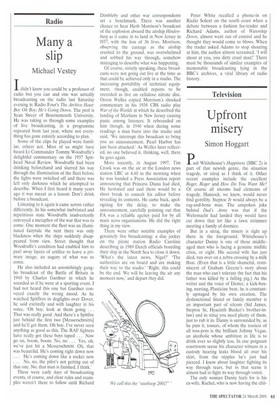Radio
Many a slip
Michael Vestey
Ididn't know you could be a professor of radio but you can and one was actually broadcasting on the radio last Saturday evening in Radio Four's The Archive Hour: Boy Oh Boy; He's Going Down. The prof is Sean Street of Bournemouth University. He was taking us through some examples of live broadcasting, in a programme repeated from last year, where not everything has gone entirely according to plan.
Some of the clips he played were familiar, others not. Most of us might have heard Lt Commander Tommy Woodruffe's delightful commentary on the 1937 Spithead Naval Review. Woodruffe had been drinking beforehand and slurred his way through the illumination of the fleet before the lights were switched off and there was left only darkness which he attempted to describe. When I first heard it many years ago it was meant as a lesson: Don't drink before a broadcast.
Listening to it again it came across rather differently. In his somewhat inebriated and repetitious state Woodruffe inadvertently conveyed a metaphor of the war that was to come. One moment the fleet was an illuminated fairytale the next there was only blackness when the ships suddenly disappeared from view. Street thought that Woodruffe's condition had enabled him to peel away layers of artifice to leave a primary image, an augury of what was to come.
He also included an astonishingly gungho broadcast of the Battle of Britain in 1940 by Charles Gardner in which he sounded as if he were at a sporting event. I had not heard this one but Gardner conveyed exactly the wrong mood. As he watched Spitfires in dogfights over Dover, he said excitedly and with laughter in his voice, 'Oh boy, look at them going ... That was really good. And there's a Spitfire just behind the first two [Messerschmitts] and hell get them. Oh boy, I've never seen anything as good as this. The RAF fighters have really got these boys taped . , . Now go on, boom, boom. No, no . . . Yes, oh, we've just hit a Messerschmitt. Oh, that was beautiful, He's coming right down now . . . He's coming down like a rocket now , . . No, no, the pilot's not getting out of that one. No, that man is finished, I think.'
These were early days of broadcasting events, of course, and clear rules and examples weren't there to follow until Richard
Dimbleby and other war correspondents set a benchmark. There was another chance to hear Herb Morrison's broadcast of the explosion aboard the airship Hindenburg as it came in to land in New Jersey in 1937, with the loss of 36 lives. Morrison, observing the carnage as the airship crashed to the ground, was overwhelmed and sobbed his way through, somehow managing to describe what was happening.
Of course, strictly speaking, these broadcasts were not going out live at the time as that could be achieved only in a studio. The increasing portability of technical equipment, though, enabled reports to be recorded as live on cellulose nitrate disc. Orson Welles copied Morrison's shocked commentary in his 1938 CBS radio play War of the Worlds in which he described the landing of Martians in New Jersey causing panic among listeners. It rebounded on him though, in 1940 when during some readings a man burst into the studio and said, 'We interrupt this broadcast to bring you an announcement. Pearl Harbor has just been attacked.' As Welles later reflected, no one believed it, thinking, well, there he goes again.
More recently, in August 1997, Tim Crook was on the air at the London news station LBC at 4.40 in the morning when he was handed a Press Association report announcing that Princess Diana had died.. He hesitated and said there would be a short break to consult his editor before revealing its contents, He came back, apologising for the delay, to make the announcement, carefully pointing out that PA was a reliable agency paid for by all main news organisations. He did the right thing in my view.
There were other notable examples of genuinely live broadcasting: a disc jockey on the pirate station Radio Caroline describing in 1989 Dutch officials boarding their ship in the North Sea to close it down. 'What's the latest news, Nigel?' The authorities are on board and are making their way to the studio.' 'Right, this could be the end. We will be leaving the air any moment now,' and depart they did.
Peter White recalled a phone-in on Radio Solent on the south coast when a debate between a fashion fur-trader and Richard Adams, author of Watership Down, almost went out of control and he thought they would come to blows. When the trader asked Adams to stop shouting at him, the author almost screamed, will shout at you, you dirty cruel man!' There must be thousands of similar examples of memorable broadcasting lying in the BBC's archives, a vital library of radio history.














































































 Previous page
Previous page